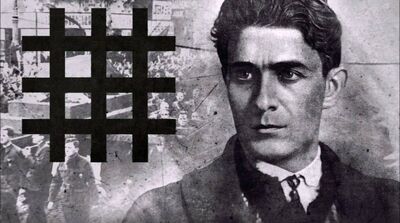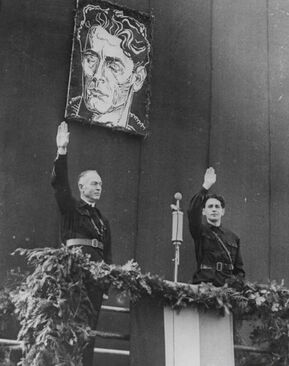


Legionary Romania After WW2
Leader: Horia Sima
Ideology: Fascism
Ruling Party: Iron Guard
Capital: Bucharest
Category: Minor Power
The Romanian Fascist political party was like no other in Europe. It possessed a distinct flare to it. One of mysticism and mystery alike. Originally founded in 1927 by the mystical Captain Corneliu Zelea Codreanu, a mysterious and charismatic individual containing strong ties with the Eastern Orthodox Church, proved to rapidly develop the organization into a prominent Romanian political force. By 1938, the Iron Guard had gained shockingly immense traction within the political scene of Romania. The reigning monarch, King Carol II enticed Codreanu with promises of power and influence over the Kingdom, rebirthing the nation if you will. Unfortunately this proved to be nothing but a ploy for the Captain. In reality, King Carol II felt that his own position of power was being directly threatened by Codreanu's massive popularity among the Romanian public, therefor turning on him and subsequently having him arrested on unfounded accusations of "slander". During his tenure, Corneliu Zelea Codreanu was informed that his sentence was to be reduced and his conditions improved by orders of King Carol, stating he was to be transferred to a more hospitable prison. By November of 1938, while in this "transfer", Codreanu, along with his closest political Guardists, were summarily murdered, execution style at the behest of the King...
The following two years under the dictatorial reign of the King proved disastrous for Romania. The nation forfeited large swaths of territory to neighboring Hungary and Bulgaria with little resistance as part of the First Vienna Award in 1940, with this same year proving to be the last to sit upon the throne for Carol II. The outraged Romanian puplic demanded his abdication, and the still highly-influential Iron Guard saw to it. Thereafter, the 'National Legionary State' was proclaimed under the leadership of the Conducâtor Ion Antonescu. However, by the start of 1941, displeased with the Conducâtor, elements within the Iron Guard attempted a coup in hopes of securing total governmental rule. This failed and the party was quickly removed from the government by Antonescu.
Operation Barbarossa was launched by the German Reich in the Spring of 1941, assisted by millions of soldiers from the various Axis nations aiding the Reich in the battle against the Bolshevik giant. One of the major contributors to this invasion was the Romanian military. Antonescu, despite still having certain resentment toward Hitler for pressuring Romania to cede much of its territory to Hungary, the German Führer promised restitution on a vast scale in the form of territorial annexations of the Soviet Union once it is defeated. The Conductâtor, viewing this as a sort of redemption for the failures of the recent King Carol II, saw such an offer as an enticing opportunity, therefor pouring substantial amounts of resources into the war effort in the east.
After two and a half years of an exhaustive and costly war effort against the Soviets, the Romanian people were beginning to lose patience with Antonescu. The war up to that point seemed as if it could go either way for the country, with the majority fearing a Soviet comeback and eventual annexation of the Kingdom of Romania. Of course, this wasn't enough to influence any sort of decisions within the government, until one vital secret in which Antonescu sought to keep hidden at all costs: the fate of the beloved founder of the Iron Guard along with the party itself.
In the winter of 1943, a powerful member of Antonescu's (and previously King Carol's) government accessed incriminating documents pertaining to the betrayal of Codreanu and the Iron Guard, a sinister plot in which was meticulously organized. Horia Sima, the direct successor to Codreanu in leader of the Iron Guard, with help from a major press outlet, published the evidence pertaining to the betrayal. Within two weeks tens of thousands of Romanians took to the streets in total outrage over this revelation, calling for Antonescu's head. On March 1944, following multiple mutinies by both the police and many government officials, now fearing for his life, Ion Antonescu fled for the German Reich, leaving the Romanian government to be assumed by the previously illegalized Romanian Iron Guard. On March 30th, 1944, an official "National Legionry Day" commenced, commemorating the sacrifices of Codrenau and the other members of the party who lost their lives by the betrayal of both the King and Antonescu alike.
Horia Sima decided to continue aiding the Germans in the war effort against the Soviets, knowing full-well the threat they posed otherwise. The Romanian military proved especially effective and fierce in the front lines by the final year of the war against the Soviets, even marching with the German military through the streets of Red Square after the capture of Moscow.
Now at the start of 1946, the National Legionary State of Romania still has many trials and tribulations ahead of it. Many in both the government and public still maintain animosity toward the Germans for their role in ceding Romanian territories to other nations, both humiliating and weakening the country alike. Moreover, there still remains strong loyalties to the Romanian monarchy by prominent sectors of the public, seeking for the restoration of the throne with Carol II's son to assume the crown, Prince Michael. On the other hand, Ion Antonescu, who still remains in exile within the German Reich, is actively seeking the return of his position of power, with some suspecting him of weakening the Iron Guards hold on power with aid of the German government, who themselves have varying motivations for placing the Conductâtor back into power...

